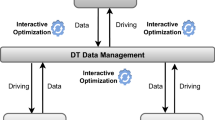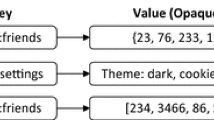Abstract
Semantic interoperability is a fundamental service in any dynamic federation that admits diverse autonomous members with heterogeneous data or service description schemata. Managing such schema diversity promotes and enables communication and collaboration within these federations. This paper presents a process, model and algorithms to manage the lifecycle, refinement and dynamic combination of semantic mappings using federation context and automated correspondence pattern recognition for complex mappings. Related work is surveyed, key requirements are derived and the system is evaluated through prototyping and experimental results for semi-automated generation of executable groundings for complex mappings.













Similar content being viewed by others
Notes
The OM2R model can be downloaded from: http://www.modelmapping.org/om2r.
Turtle/RDF is a human-readable text-based syntax for writing RDF triples and is currently a W3C Candidate Recommendation, http://www.w3.org/TR/turtle/.
References
Umbrich, J., Hausenblas, M., Hogan, A., Polleres, A., Decker, S.: Towards dataset dynamics: change frequency of linked open data sources. In: Proceedings of the Linked Data on the Web Workshop (LDOW2010), Raleigh, North Carolina, USA, 27 Apr 2010
Shvaiko, P., Euzenat, J.: Ontology matching: state of the art and future challenges. IEEE Trans. Knowl. Data Eng. 25(1), 158–176 (2013). doi:10.1109/TKDE.2011.253
Thomas, H., O’Sullivan, D., Brennan, R.: Ontology mapping representations: a pragmatic evaluation. In: Proceedings of 21st International Conference on Software Engineering and Knowledge Engineering (SEKE), Boston, pp. 228–232, 2009
Euzenat, J., Scharffe, F., Zimmermann, A.: Expressive alignment language and implementation. Deliverable 2.2.10, Knowledge Web NoE, 2007
O’Sullivan, D., Wade, V., Lewis, D.: Understanding as we roam. IEEE Internet Comput. 11(2), 26–33 (2007). doi:10.1109/MIC.2007.50
Moser, T., et al.: Semantic service matchmaking in the ATM domain considering infrastructure capability constraints. In: Proceedings of 21st International Conference on Software Engineering & Knowledge Engineering, SEKE 2009, 1–3.06, Boston, pp. 222–227, 2009
Weidman, S., Arrison, T.: Steps toward large-scale data integration in the sciences. ISBN: 0-309-15443-X, 2010
Jennings, B., Brennan, R., Donnelly, W., et al.: Challenges for federated, autonomic network management in the future Internet. In: 1st IFIP/IEEE International Workshop on Management of the Future Internet, New York, 5 June 2009, IEEE, 2009
Yang, K., Steele, R.: A framework for ontology mapping for the semantic web. In: Proceedings of the International Conference on Information Technology in Asia, http://www-staff.it.uts.edu.au/~kayang/download/AFOMSW.pdf, 2007
Alexander, K., et al.: Describing Linked Datasets, LDOW2009, 20 Apr, Madrid, Spain, 2009
Millard, I., Glaser, H., Salvadores, M., Shadbolt, N.: Consuming multiple linked data sources: challenges and experiences. In: First International Workshop on Consuming Linked Data (COLD2010), Shanghai, 2010
Feeney, K., Brennan, R., Keeney, J., Thomas, H., Lewis, D., Boran, A., O’Sullivan, D.: Enabling decentralised management through federation. Comput. Netw. 54(16), 2825–2839 (2010)
Scharffe, F., Fensel, D.: Correspondence patterns for ontology alignment. In: Gangemi, A., Euzenat, J. (eds.) Knowledge Engineering: Practice and Patterns. Lecture Notes in Computer Science, vol. 5268, pp. 83–92 (2008)
L′opez de Vergara, J.E., Guerrero, A., Villagr′a, V.A., Berrocal, J.: Ontology-based network management: study cases and lessons learned. J. Net. Sys. Man. 17(3), 234–254 (2009). Sp. Iss.: Ontological Approaches for Net. and Serv. Man.
Strassner, J., Neumann de Souza, J., van der Meer, S., Davy, S., Barrett, K., Raymer, D., Samudrala, S.: The design of a new policy model to support ontology-driven reasoning for autonomic networking. J. Net. Sys. Man. 17(1–2), 5–32 (2009)
Shvaiko, P., Euzenat, J.: A survey of schema-based matching approaches. J. Data Semant. Long version in DIT Technical Report, DIT-04-87, 2004
Mena, E., Illarramendi, A., Kashyap, V., Sheth, A.: Observer: an approach for query processing in global information systems based on interoperation across pre-existing ontologies. Distrib. Parallel Databases 8(2), 223–271 (2000)
Wache, H., Vögele, T., Visser, U., Stuckenschmidt, H., Schuster, G., Neumann, H., Hübner, S.: Ontology based integration of information—a survey of existing approaches. In: Proceedings of the IJCAI Workshop on Ontologies and Information Sharing, pp. 108–117, 2001
Bockting, S.: A semantic translation service using ontologies advances in web-age information management. In: Lecture Notes in Computer Science, vol. 3129/2004, pp. 249–258, 2004
Jain, H., Zhao, H.: Federating heterogeneous information systems using web services and ontologies. In: AMCIS 2004 Proceedings, 2004
Oldham, N., Verma, K., Sheth, A., Hakimpour, F.: Semantic WS-agreement partner selection. In: Proceedings of the 15th International Conference on World Wide Web (WWW ‘06), pp. 697–706. ACM, New York, NY, USA, doi:10.1145/1135777.1135879
Doran, P., Tamma, V., Payne, T., Palmisano, I.: Dynamic selection of ontological alignments: a space reduction mechanism. In: Proceedings of IJCAI’2009, pp. 2028–2033, 2009
Cudré-Mauroux, P.: Emergent semantics: rethinking interoperability for large scale decentralized information systems. In: Self-Organizing Knowledge Systems Symposium, VU Amsterdam, 29 Apr 2010
Giunchiglia, F., Autayeu, A., Pane, J.: S-Match: an open source framework for matching lightweight ontologies. Compute 1, 1–9 (2010)
Miller, G.A.: WordNet: a lexical Database for English. Commun. ACM 38(11), 39–41 (1995)
Fagin, R., Haas, L.M., Hern, M., Miller, R.J., Popa, L., Velegrakis, Y.: Clio: schema mapping creation and data exchange. Concept. Model. Found. Appl. 5600(2009), 198–236 (2009)
David, J., Euzenat, J., Scharffe, F., Trojahn dos Santos, C.: The alignment API 4.0. Semant. Web 2(1), 3–10 (2011)
Ritze, D., Meilicke, C., Sváb-Zamazal, O., Stuckenschmidt, H.: A pattern-based ontology matching approach for detecting complex correspondences. In: Proceedings of international workshop on ontology matching (OM), 2009
Euzenat, J., et al.: Final results of the ontology alignment evaluation initiative 2011. In: ISWC workshop on Ontology Matching, 2011
Brennan, R., Feeney, K., Walshe, B., Thomas, H., O’Sullivan, D.: Explicit federal relationship management to support semantic integration. In: 1st IFIP/IEEE Workshop on Managing Federations and Cooperative Management, Dublin, 23 May 2011, IEEE, 2011, pp. 1148–1156
Walshe, B., Brennan, R., O’Sullivan, D.: Correspondence pattern attribute selection for consumption of federated data sources. IFIP/IEEE DANMS 2012, Hawaii, 16 Apr 2012
Thomas, H., Brennan, R., O’Sullivan, D.: MooM—a prototype framework for management of ontology mappings. In: Tan, H., Taniar, D., Uehara, M. (eds.) 25th IEEE International Conference on Advanced Information Networking and Applications, Singapore, 22–25 Mar 2011. IEEE, pp. 548–555 (2011)
Feeney, K., Foley, S.N., Brennan, R.: A trust model for capability delegation in federated policy systems. In: Sixth International Conference on Risks and Security of Internet and Systems, Timioara, Romania, 26–28 Sept 2011, pp. 47–54
MacKay, D.: Information Theory, Inference, and Learning Algorithms, pp. 32–35. Cambridge University Press, Cambridge (2003)
Yang, Y., Pedersen, J.O.: A comparative study on feature selection in text categorization. In: ICML ‘97 Proceedings of the Fourteenth International Conference on Machine Learning, pp 412–420, 1997
Quinlan, J.R.: C4.5: Programs for Machine Learning. Morgan Kauffman (1993)
Bizer, C., et al.: DBpedia—A crystallization point for the Web of Data. Web Semantics: Science, Services and Agents on the World Wide Web, no. 7, pp. 154–165, Sept 2009
Suchanek, F.M., Kasneci, G., Weikum, G.: Yago: a large ontology from wikipedia and wordnet. Web Semant. Sci. Serv. Agents World Wide Web 6(3), 203–217 (2008)
Acknowledgments
This research is supported by the Science Foundation Ireland (Grant 08/SRC/I1403) as part of the FAME Strategic Research Cluster (www.fame.ie).
Author information
Authors and Affiliations
Corresponding author
Rights and permissions
About this article
Cite this article
Brennan, R., Walshe, B. & O’Sullivan, D. Managed Semantic Interoperability for Federations. J Netw Syst Manage 22, 302–330 (2014). https://doi.org/10.1007/s10922-013-9291-3
Received:
Revised:
Accepted:
Published:
Issue Date:
DOI: https://doi.org/10.1007/s10922-013-9291-3




